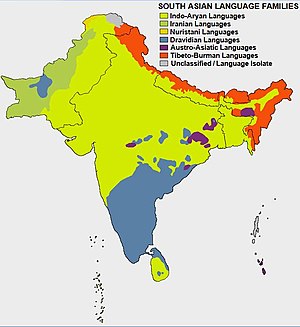Regional languages in India
| Languages of India | |
|---|---|

|
|
| Official languages |
Assamese Bengali Bodo Dogri English Gujarati Hindi Kannada Kashmiri Konkani Maithili Malayalam Marathi Meitei (Manipuri) Nepali Odia Punjabi Sanskrit Santali Sindhi Tamil Telugu Urdu (Total: 23, including 22 8th Schedule languages and additional official language, English) |
| Main foreign languages | |
| Sign languages | |
Languages spoken in India belong to several language families, the major ones being the Indo-Aryan languages spoken by 75% of Indians and the Dravidian languages spoken by 20% of Indians. Other languages belong to the Austroasiatic, Sino-Tibetan, Tai-Kadai, and a few other minor language families and isolates.
Article 343 of the Indian constitution states that the official language of the Union government shall become Hindi in Devanagari script instead of the extant English, but is superseded by English subsequently too as mentioned in section 3 of the same constitutional article that is put to effect by . The form of numerals to be used for the official purposes of the Union were supposed to become international form of Indian numerals consequently apart from numerals in English language. The Constitution of India does not give any language the status of national language.
English was legislated to be reduced to the status of a "subsidiary official language" after fifteen years. But this provision of the constitution was negated by a provision in Section 3, of the same Article 343 that gave primacy to . The Eighth Schedule of the Indian Constitution lists 22 languages, which have been referred to as scheduled languages and given recognition, status and official encouragement. In addition, the Government of India has awarded the distinction of classical language to Tamil, Sanskrit, Kannada, Telugu, Malayalam and Odia.
...
Wikipedia
